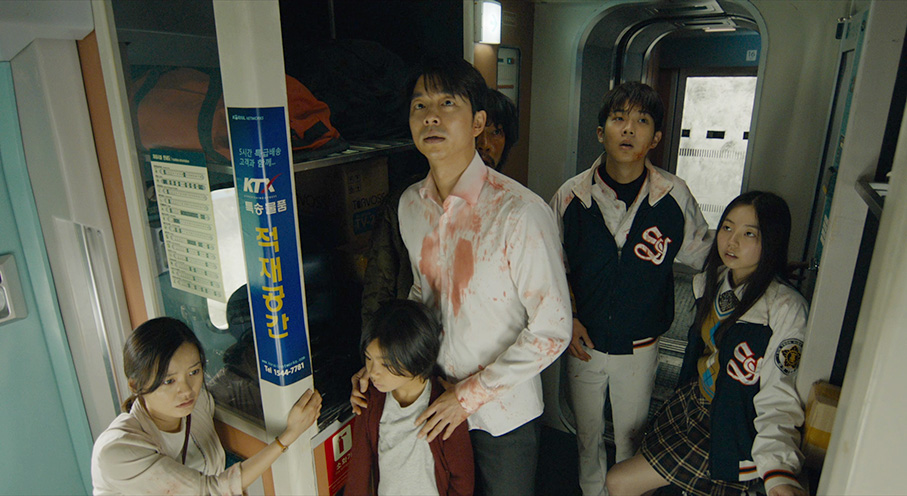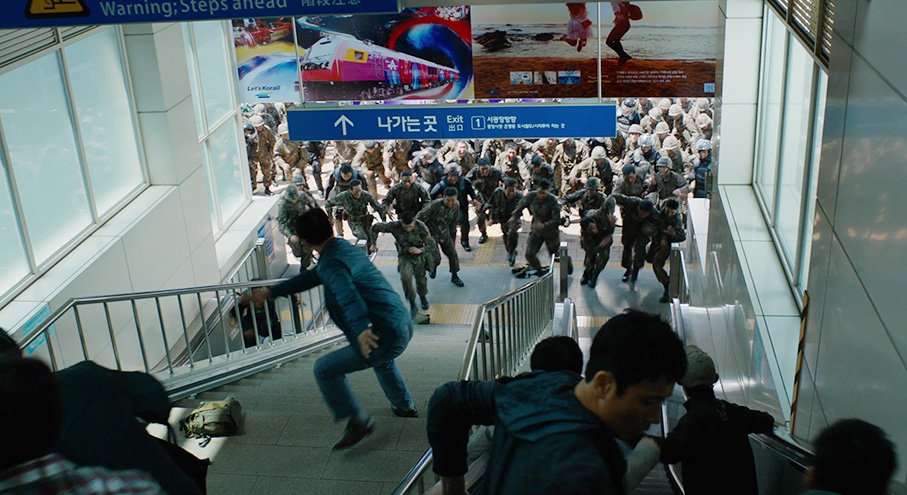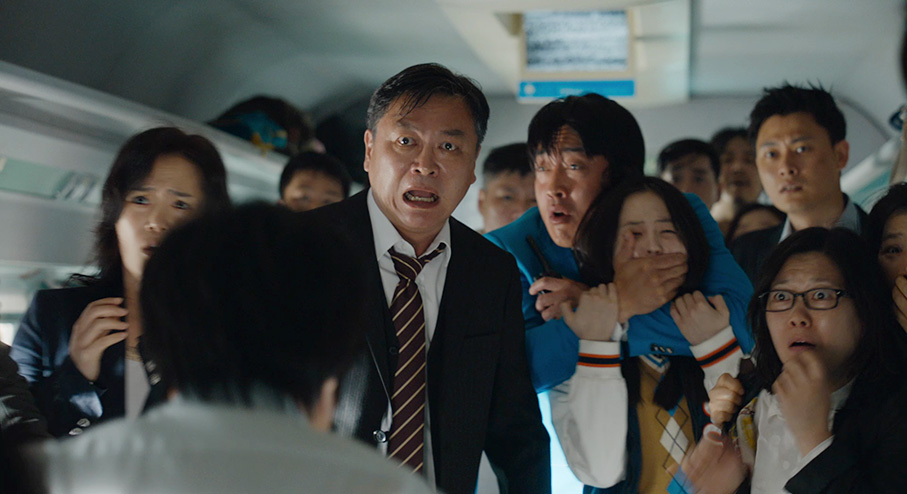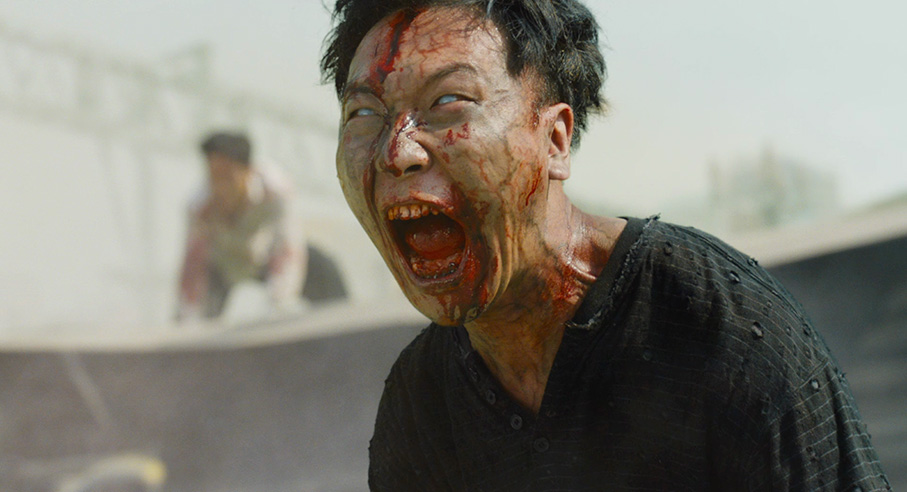|
In recent years, there’s been a trend in genre movies for portraying families as broken and fathers as distracted, tortured or irresponsible, particularly when it comes to children or ex-wives. The purpose is singular, to set them up with the unconscious goal of realising their failings and, over the course of whatever life-threatening adventure unfolds, re-bonding him with his child and his estranged partner in order to restore the family unit. Man, am I fed up with seeing this.
With all that in mind, consider the setup of the 2016 Korean zombie movie Train to Busan. Divorced fund manager Seok-woo lives in Seoul with his young daughter Soo-an but is so wrapped up in his job that he seems to only spend time with her in passing. He remembers her birthday almost as an afterthought, but is too busy to expend any thought on selecting an appropriate present, so asks the advice of an underling instead. He ends up buying her a Nintendo Wii, which would all be well and fine if this wasn’t the exact same present he bought her for Children’s Day. Shamed by his negligence, he offers to get her anything she wants by way of compensation, and Soo-an requests that he takes her to see her mother, who now lives in Busan. Want to guess what mode of transport they choose to make the journey? As they board the bullet train to Busan the following morning, a virulent virus begins to take hold of the city, one that transforms people into ravenous zombies and prompts them to spread the infection by attacking and biting anyone in sight. Moments before departure, an infected girl stumbles on to the train and begins a transformation that has the potential to take down every one of the passengers.

There’s no question that Train to Busan is a zombie movie, but it’s more 28 Days Later than Night of the Living Dead, taking its cue from Danny Boyle’s post-apocalyptic horror-thriller and running with it like a furious jaguar on steroids. Like Boyle’s Rage Virus, the infection here is fast-acting and easily spread, transforming victims in a series of jerkily bone-crunching twists into ravenous and instinct-driven cannibals that are able to spread the disease in a single bite. And once transformed, these creatures move fast. Drop one of the infected into a shopping centre and the place would be overrun in a matter of minutes, as panicking crowds fall over themselves to flee, are leapt on and bitten and in the space of a few seconds become part of this rapidly expanding undead army.
It’s this speed of transformation and infection that delivers Train to Busan’s first major “Oh shit!” moment (and believe me, there are many) when a concerned female attendant stops to help the infected girl who has boarded the train. Moments later, both women are tearing into those around them, chewing on passengers who then turn on others, a process that quickly lays waste to half the carriage and sends everyone else there scurrying for their lives. I remember thinking on my first viewing that at this speed of contagion the film will be over in a matter of minutes. But by economically introducing us to a number of passengers in the style of a waste-free disaster movie, director Yeon Sang-ho – a former animator whose credits include the stylish and hard-hitting King of Pigs and is here making his first live-action feature – gives us characters to root for beyond Seok-woo and Soo-an. There’s beefy hard man Sang-hwa and his pregnant wife Seong-kyeong, elderly sisters Jong-gil and In-gil, and a high-school baseball team whose cheerleader Jin-hee has a bit of a thing for shy student Yong-guk. Thinking only of himself is pushy and demanding company CEO Yon-suk, and hiding in the toilet is a traumatised homeless man who has witnessed at first hand the horror that will soon engulf the whole train. Initially introduced as individuals, couples or small groups, they are soon interacting through chance encounters and short while later through necessity, where a desperate will to survive prompts them each to improvise and adapt in different ways, not always to the benefit of those around them.

Structurally and in the confidence and technical skill of its execution, Train to Busan is a masterclass in how to tell a gripping and involving, action-based horror story. The time the film takes on the main character setup is all well spent, and the early hints of how the horror will unfold – a roadkill deer that returns to its feet with glazed-over eyes and a through-the-window glimpse of a solitary attack as the train departs – are deliciously teasing. But when the mayhem breaks out, it does so with breathless fury, the sheer scale and ferocity of the attacks enhanced by the claustrophobic nature of the location and camerawork and editing that almost seem to feed off the characters’ sense of panic and fear, but without ever feeling controlled by it. That headache-inducing trend for waggling the camera wildly has no place here, and no matter how fast the pace, we are never left having to second-guess the specifics of what just took place. Ferocious fights for survival are punctuated by nail-biting scenes of stealth and strategy, and sequences in which characters pause to take stock of the situation and plan their next move. The ante is upped further when the train stops at an eerily silent Daejeon station, and the sudden arrival of a hoard of infected soldiers and civilians splits the group into factions that have to individually battle their way back to the train, where Seok-woo and Sang-hwa are separated from their loved ones, who have barricaded themselves in a corridor toilet surrounded by a hoard of the hungry undead.
If this was an American genre film, you could safely bet your savings on an ending that would see Seok-woo and Soo-an reunited with Soo-an’s mother, and she and Seok-woo would be so relieved to see each other that they’d happily put all their past troubles behind them and come together for the good of the child and their own future happiness. See how cynical that convention has made me? But this is not a Hollywood movie but a Korean one, and anyone who knows their way around modern Korean horror and thriller cinema will be aware that when it comes to happy endings and even character survival, all bets are off. And in terms of story tension, that changes everything. By continually hitting his protagonists with new problems, varying the solutions and throwing in a whole string of curve-balls, Yoen makes it nigh-on impossible to predict where the story will go next, and the tension is sustained by his willingness to kill off characters without warning or ceremony, making every encounter a potentially lethal one for anyone involved. And it’s disarming how quickly we learn to care for these people, as they fight for their lives against impossible odds and embark on individual journeys of self-discovery, humility, and previously unrealised bravery. And instead of having his characters holding the mobile phones aloft in search of a signal in the many of so many unimaginative western horror flicks, Yeon ingeniously integrates them into his story – even apps and ringtones are put to smart use here. Enriching the mix is some topical political allegory, primarily realised in wealthy businessman Yon-suk’s angry demands and infuriating willingness to sacrifice others to save his own skin. At one point he even convinces the occupants of a safe carriage to block entrance to Seok-woo and his companions, not on the basis of what they are but of what they could be, and when they do break in, he exploits the fears of his companions to have them expelled. Remind you of anyone?

Train to Busan is a thunderously impressive achievement, one whose principal threat arrives quietly and then explodes, quickly building the pace to a level that left me breathless even in moments of relative calm. The bond that we form with the characters helps to deliver a handful of real emotional gut-punches, and the sequential piling up of setbacks, nick-of-time dodges and hair-breadth escapes – not to mention a sprinkling of sudden shock losses and acts of self-sacrifice – more than once had me trying to conjure up some calm images to get my pounding heartrate back to a safe level. The performances are first-rate, the effects and makeup convincing, and the blend of action, horror and character interaction is timed and proportioned to perfection. Depressingly but somewhat inevitably, a Hollywood remake is already on the cards that I’ve absolutely no interest in seeing, as there’s no way they’ll improve on what Yeon has achieved here. I’m always keen to avoid overstatement, but for me Train to Busan is not just one of the best zombie-themed films I’ve seen since the glory days of George Romero, but far and away one of the most viscerally exciting movies I’ve sweated and chewed my fingernails through in years.
Shot digitally on Arri Alexa XT cameras, the 1.85:1 1080p transfer on Studiocanal’s Blu-ray release is absolutely pristine. Sharpness and image detail are consistently excellent, the contrast impeccably balanced, the black levels solid without sucking in surrounding detail, and in a largely naturalistic palette (hoorah), brighter colours are vividly rendered. It helps that most of the film takes place in bright daylight, but even when train hits a tunnel and the light levels drop, the image is always clear.

A little surprisingly, the default soundtrack is Linear PCM 2.0 stereo, which boasts an impressive clarity and range, but there’s also a DTS-HD Master Audio 5.1 surround track that is even better, spreading Jang Young-gyu’s pounding score around the room and having a generally richer feel, though the LFE bass gets less of a workout than I was expecting.
The optional English subtitles are clear and kick on by default, as you would hope.
The Making of Train to Busan (17:29)
A disordered but still interesting collection of behind-the-scenes footage, the best of which reveals how some of the in-carriage material was shot (camera track on luggage racks, video walls for passing scenery). A couple of fumbled takes and a small injury are included, and for some reason some of the shots that appear later are also run as a pre-title intro, except there’s no title.
Also directed by Yeon Sang-ho and soon to be released on UK Blu-ray and DVD is Seoul Station, an animated prequel and companion piece to Train to Busan, and included on this disc as a small sales pitch is Sneak Peek of Seoul Station (2:19), which is basically the opening two minutes of the film including titles and logos, and Seoul Station Trailer (1:23), which should give you a taste of what you’re in for (I’ve yet to see the film).
One of my favourite film releases of 2016 loses none of its magnificence and sheer gusto on subsequent viewings, and looks and sounds terrific on Studiocanal’s Blu-ray. Personally, I’d like to have seen a few more special features, particularly as two of those included here are effectively (albeit related) sales pitches, but for the film itself and the first-class transfer, this still comes highly recommended.
|